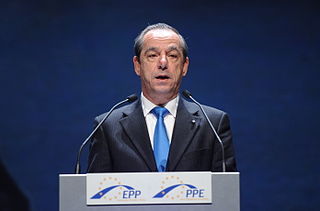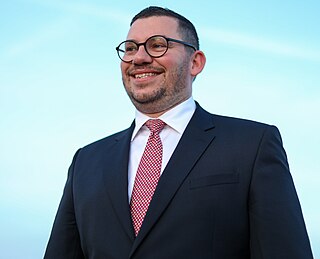
Euroscepticism means criticism of the European Union (EU) and European integration. It ranges from those who oppose some EU institutions and policies and seek reform, to those who oppose EU membership outright and see the EU as unreformable. The opposite of Euroscepticism is known as pro-Europeanism.

The politics of Malta takes place within a framework of a parliamentary representative democratic republic, whereby the President of Malta is the constitutional head of state. Executive Authority is vested in the President of Malta with the general direction and control of the Government of Malta remaining with the Prime Minister of Malta who is the head of government and the cabinet. Legislative power is vested in the Parliament of Malta which consists of the President of Malta and the unicameral House of Representatives of Malta with the Speaker presiding officer of the legislative body. Judicial power remains with the Chief Justice and the Judiciary of Malta. Since Independence, the party electoral system has been dominated by the Christian democratic Nationalist Party and the social democratic Labour Party.

The Nationalist Party is a Christian-democratic, conservative political party in Malta. It is one of two major contemporary political parties in Malta, along with the governing Labour Party. The Nationalist Party is currently in opposition to the Labour Party.

The European Union (EU) has expanded a number of times throughout its history by way of the accession of new member states to the Union. To join the EU, a state needs to fulfil economic and political conditions called the Copenhagen criteria, which require a stable democratic government that respects the rule of law, and its corresponding freedoms and institutions. According to the Maastricht Treaty, each current member state and the European Parliament must agree to any enlargement. The process of enlargement is sometimes referred to as European integration. This term is also used to refer to the intensification of co-operation between EU member states as national governments allow for the gradual harmonisation of national laws.

Lawrence Gonzi, is a Maltese politician, retired Nationalist politician and lawyer, who served for twenty-five years in various critical roles in Maltese politics. Gonzi was Prime Minister of Malta from 2004 to 2013, and leader of the Nationalist Party. He also served as speaker of the House from 1988 to 1996, and Minister of Social Policy from 1998 to 2004, as well as Deputy Prime Minister from 1999 to 2004. He served in practically all positions in Parliament, being also Leader of the House, an MP and Leader of the Opposition.

The United Kingdom European Communities membership referendum, also known variously as the Referendum on the European Community , the Common Market referendum and EEC membership referendum, took place under the provisions of the Referendum Act 1975 on 5 June 1975 in the United Kingdom to gauge support for the country's continued membership of the European Communities (EC) — often known at the time as the European Community and the Common Market — which it had entered two and a half years earlier on 1 January 1973 under the Conservative government of Edward Heath. Labour's manifesto for the October 1974 general election had promised that the people would decide through the ballot box whether to remain in the EC.

This is a list of referendums related to the European Union, or referendums related to the European Communities, which were predecessors of the European Union. Since 1972, a total of 48 referendums have been held by EU member states, candidate states, and their territories, with several additional referendums held in countries outside of the EU. The referendums have been held most commonly on the subject of whether to become a member of European Union as part of the accession process, although the EU does not require any candidate country to hold a referendum to approve membership or as part of treaty ratification. Other EU-related referendums have been held on the adoption of the euro and on participation in other EU-related policies.
Alfred Sant, is a Maltese politician and a novelist. He led the Labour Party from 1992 to 2008 and served as Prime Minister of Malta between 1996 and 1998 and as Leader of the Opposition from 1992 to 1996 and from 1998 to 2008.

For Fatherland and Freedom/LNNK was a free market national conservative political party in Latvia. In 2011, it dissolved and merged into the National Alliance.

Democratic Alternative, sometimes referred to as AD – The Green Party, is a green political party in Malta particularly dedicated to environmentalism.

Euroscepticism, i.e. the opposition to policies of supranational European Union institutions and/or opposition to Britain's membership of the European Union, has been a significant element in the politics of the United Kingdom (UK). A Eurobarometer survey of EU citizens in 2009 showed that support for membership of the EU was lowest in the United Kingdom, alongside Latvia and Hungary.
Events from the year 2003 in the European Union.

A referendum on European Union membership was held in Latvia on 20 September 2003. Latvia was the last of the states which would join the EU in 2004 to hold a referendum on the issue. Just over two-thirds of voters voted Yes and Latvia joined the EU on 1 May 2004.
A referendum on joining the European Union was held in Hungary on 12 April 2003. The proposal was approved by 83.8% of voters, with a voter turnout of 45.6%. Hungary subsequently joined the EU on 1 May 2004.

The 2004 enlargement of the European Union was the largest single expansion of the European Union (EU), in terms of territory, number of states, and population to date; however, it was not the largest in terms of gross domestic product. It occurred on 1 May 2004.
Michael Briguglio is a Maltese sociologist, activist and politician.
Karmenu Mifsud Bonnici, is a Maltese politician who served as Prime Minister of Malta from December 1984 to May 1987. He is a member of the Labour Party. He studied law at the University of Malta.

Cyrus Engerer is a Maltese politician, known for his public stands on Civil Rights and Malta's National Identity. He is the Prime Minister's Special Envoy to the European Union and also a candidate for the 2019 European Parliament Election on behalf of the Labour Party.

Since the foundation of the European Communities, the United Kingdom has been an important neighbour and is currently a major member, until its withdrawal.


















